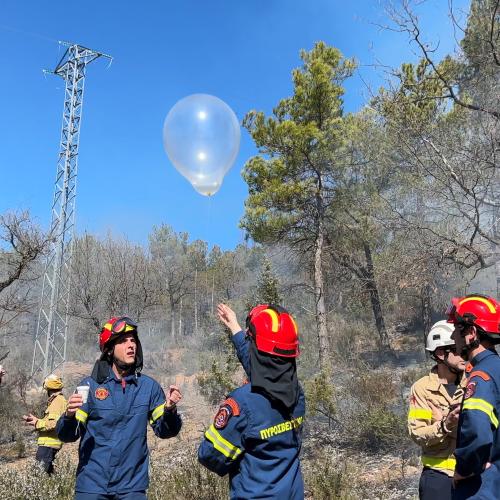
From 12 to 14 March, 28 partners of the European project EWED (Extreme Wildfire Events Data Hub for Improved Decision Making) participated in a workshop on using radiosondes to collect real-time data during wildfires. The workshop was held in Manresa (theoretical sessions) and the Solsonés region (launching of the probes during a prescribed burn) and was organised by the members of GRAF (Catalan Fire and Rescue Service).
This workshop has served to align the objectives and expectations of the different project partners and to gain a better understanding of what we will be doing during these two years. However, the main goal has been to understand how wildfire data are collected. It is the first time that this data collection will be done on a massive scale at the European level.
Extreme Wildfire Events (EWEs) burn more intensely and spread more rapidly than other wildfires due to the interaction of the flames with the atmosphere. Their behaviour is unpredictable, and there is not enough knowledge of them, which makes it difficult to respond. In the current context of climate change, with higher temperatures and drier conditions, the risk of EWEs is increasing worldwide.
The EWED project aims to improve the capacity for preparation and response to EWEs, mainly through the creation of a new open data portal that will allow real-time analysis of ongoing fires, helping decision-making by emergency services during these events. Led by the Pau Costa Foundation, the project consortium is made up of six institutions including fire services and research, rescue, public safety, and non-profit organisations from northern and southern Europe.
The main activity of the workshop was, during a prescribed burn, the practice of radiosonde launching and the subsequent processing of the collected data.
We have collected data on a prescribed burn because it is a controlled environment where we can practice safely, without the pressure of having to manage a fire, giving us an ideal setting to practice.
Additionally, participants identified key points for the joint design of the open data portal, between practitioners and researchers, ensuring that it is practitioner-friendly.
What I have learned most over these days is that, even more than I had already realised, it is very important to bring science and practice closer together. We need each other to make EWED a success, and the best way to start this process these past few days was talking, spending time together, and practicing together in the field to identify things we need to address in the near future.
The experience of this workshop will result in the generation of protocols for collecting data during wildfires using radiosondes and the subsequent analysis of the data. Furthermore, EWED practitioners and researchers will work together to, in addition to creating the data portal, generate simulations and models of the fire-atmosphere interaction and recommendations to help Europe face EWEs, hoping to contribute to protecting society and the environment.
Close cooperation between practitioners and science is the only way to face the challenges of the future.
The consortium will meet again in November in Greece to reflect on the progress made so far and decide the next steps.
Sectors
Risk drivers